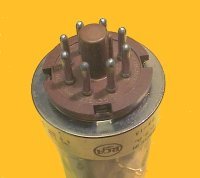Antique radios, Old Time Radios

CV79_prototype-12seg
|
|
|
|
|
| Tube type: |
CW-magnetron |
| |
Ca. 1925 up to 1945 no serial production. For
instance only development samples. ***** |
|
| Identical to |
CV79_prototype-12seg
|
| Similar
Tubes |
Other characteristic (electr. data):
CV79_prototype-8seg
|
|
Successor Tubes
|
CV79
CV89
|
| Base |
Octal (Int.Octal, IO) K8A, USA 1935
|
| Filament |
Indirect |
| Description |
At GEC E.C. Megaw experimented with magnetron oscillators since the early thirties. The split-anode structure had evolved to four-segment thanks to Yagi in 1928. The four-segment magnetron was investigated by Megaw, Posthumous, Runge et al in the very early thirties. It was observed that more stable operation at low magnetic fields could be achieved by increasing the number of segment pairs. As result, many types of multi-segment magnetron were introduced mainly in Germany, often referred to as interdigital or 'squirrel cage' type.
Megaw experiments with interdigital types led to the introduction of CV79 and of its frequency variant CV89.
Here one of the twelve-segment experimental samples made by Megaw. Likely the losses due to the bakelite octal base led to the decision of using all-glass lock-in bases in the production types.
Give also a look at the GEC eight-segment experimental prototype.
|
|
|
|

Just Qvigstad
|
|
Collection of
|
|
|
|
You reach this tube or valve page from a search
after clicking the "tubes" tab or by clicking a tube
on a radio model page. You will find thousands
of tubes or valves with interesting links. You
even can look up radio models with a certain tube
line up.
[rmxtube-en]
| Data Compliance |
More Information |
|
|
|

